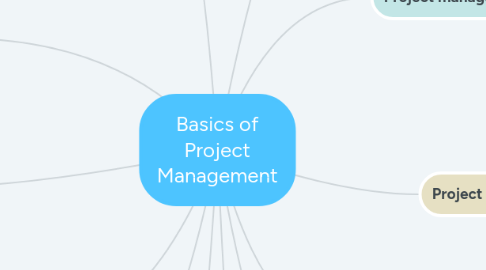
1. Quality Indicators
1.1. Plan, manage and control quality of the deliverables in a project
1.1.1. Plan for quality by identifying records and standards, as well as documenting adherence to them.
1.1.2. Manage quality: transforms the strategy into actions that can be carried out.
1.1.3. Quality control: the produced outcomes are observed and recorded.
2. Resources management
2.1. It includes identifying, acquiring and managing project resources.
3. Develop the project communication plan
3.1. Process for ensuring that the project's and its stakeholders' information demands are delivered effectively.
3.1.1. Plan communication management
3.1.2. Manage communications
3.1.3. Monitorear las comunicaciones
4. Risk management
4.1. Involves how to perform embracing the level, type and visibility proportional to risks and project relevance to the organization and stakeholders involved.
5. Plan procurement management
5.1. Documenting project procurement decisions
5.2. Identifying the approach
5.3. Looking for potential sellers
6. Stakeholder management
6.1. Creating management solutions to involve stakeholders successfully throughout the project life cycle
6.1.1. It is advantageous because it provides a clear and practical plan for interacting with stakeholders in order to support the project's goals.
7. Project Charter
7.1. authorizes the existence of a project and establishes a relationship between the project and the organization's strategic goals.
7.1.1. Input
7.1.1.1. Business documents
7.1.1.1.1. Business case
7.1.1.1.2. Benefits managent plan
7.1.1.2. Agreements
7.1.1.3. Enterprise environmental factors
7.1.1.4. Organizational Process Assets
7.1.2. Tools & Techniques
7.1.2.1. Expert Judgement
7.1.2.2. Data Gathering
7.1.2.2.1. Brainstorming
7.1.2.2.2. Focus group
7.1.2.2.3. Interview
7.1.2.3. Meetings
7.1.2.4. Interpersonal team skill
7.1.3. Outputs
7.1.3.1. Project charter
7.1.3.1.1. Purpose, objectives, scope, deliverables, risks, milestones, resources, team charter, stakeholders, requirements, Project Manager, and contact.
7.1.3.2. Assumption log
8. Project management plan
8.1. All plan components are defined, prepared, and coordinated before being consolidated into a plan.
8.1.1. It is beneficial to outline all project work and required know-how.
9. Project scope management
9.1. The Work Breakdown Structure (WBS) is the segmentation of deliverables and tasks to make them easier to manage and perform.
9.1.1. It's a breakdown of the project's scope in a hierarchical order.
10. Project schedule management
10.1. Sequence activities are the process of identifying and recording the links between activities.
10.1.1. Its goal is to describe the logical sequence of work in order to be more efficient while taking into account the constraints.
11. Develop the schedule
11.1. It is used for project planning, execution, control, and monitoring.
11.1.1. Schedule
11.1.2. Cost baseline
11.1.3. Integrated change control
11.1.4. Calendar
12. Project cost management
12.1. Budgeting is summing up the estimated costs of various activities. The budget takes into account the funds required to complete the task.
12.1.1. Its main advantage is that it establishes the base cost line for monitoring and controlling performance.
